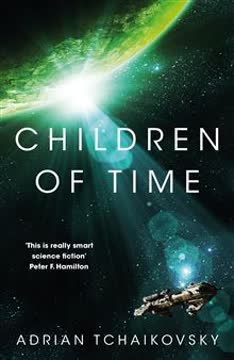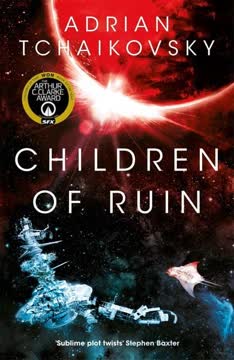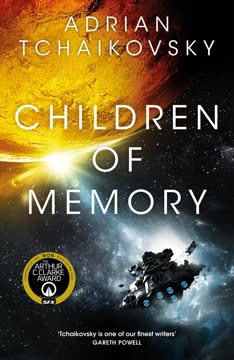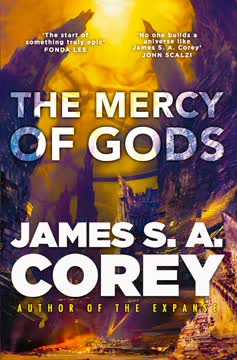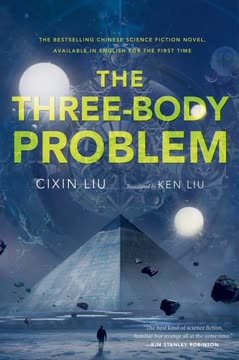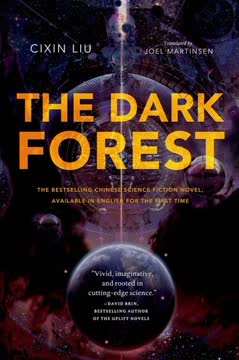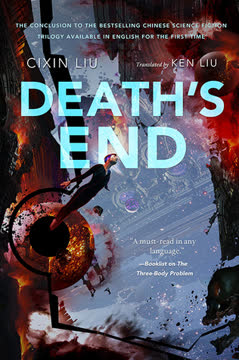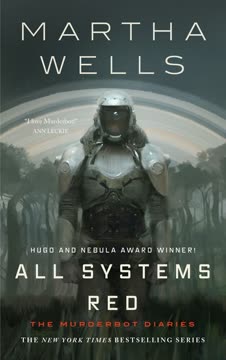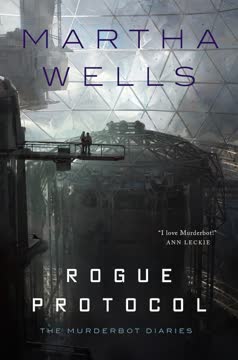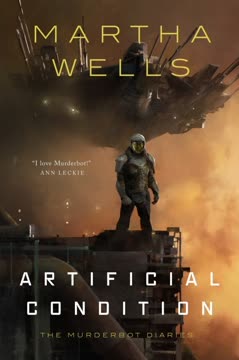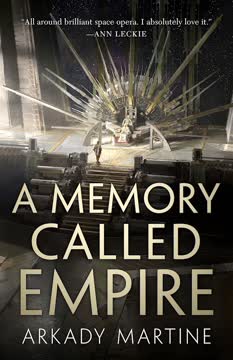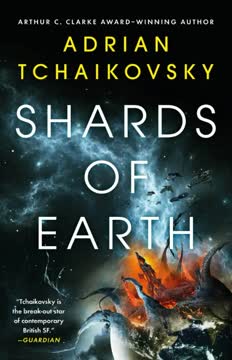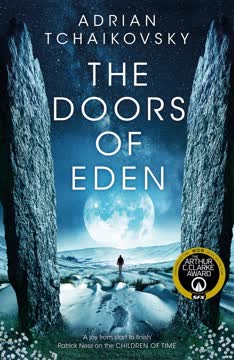Plot Summary
Humanity's Last Hope: A New World
As Earth becomes uninhabitable, the last survivors of humanity embark on a desperate journey to find a new home among the stars. They discover a planet, seemingly perfect for human life, but it is not the untouched paradise they hoped for. Instead, it is a world transformed by the ambitions of the past, now home to a new dominant species. The fate of humanity hangs in the balance as they confront the challenges of this new world and the remnants of the civilization that came before them.
Avrana Kern's Grand Experiment
Doctor Avrana Kern, a visionary scientist, oversees a grand experiment on a distant planet. Her goal is to uplift a species of monkeys to sentience using a nanovirus, creating a new form of intelligent life. However, the experiment takes an unexpected turn as the monkeys are destroyed, and the virus finds a new host in the planet's invertebrates. Kern's dream of creating godlike beings is replaced by a world where spiders and ants evolve into complex societies, driven by the virus's relentless push for advancement.
The Rise of the Spiders
On the planet, a species of spiders, led by a formidable huntress named Portia, rises to dominance. The nanovirus accelerates their evolution, granting them intelligence and complex social structures. As they explore their world, they encounter other uplifted species, including ants that have formed a supercolony. The spiders' society thrives on cooperation and innovation, but they face constant threats from the ants and the remnants of Kern's experiment, which continue to influence their world.
Mutiny on the Gilgamesh
Aboard the ark ship Gilgamesh, tensions rise as colonists resist being sent to a harsh moon colony. Led by a man named Scoles, they stage a mutiny, taking hostages and seizing control of a shuttle. Their goal is to reach the planet and escape the confines of the moon base. The mutineers believe the planet holds the key to their survival, but they must first navigate the dangers posed by the satellite guarding it and the creatures that inhabit its surface.
The Ants' Relentless March
The ant supercolony, a relentless force of nature, advances across the planet, consuming everything in its path. Portia and her fellow spiders face the threat of annihilation as the ants approach their city, Great Nest. The spiders must use all their ingenuity and courage to defend their home, employing new weapons and strategies to combat the overwhelming numbers of the ants. The battle for survival becomes a test of their society's resilience and adaptability.
A Desperate Gamble
As the mutineers' shuttle approaches the planet, they face the wrath of the satellite controlled by the remnants of Avrana Kern. Holsten Mason, a classicist, and Isa Lain, the chief engineer, are forced to negotiate with the satellite's AI to avoid destruction. They attempt to convince Kern of their peaceful intentions, but the situation is precarious. The mutineers' fate hangs in the balance as they gamble on their ability to outwit the satellite and land safely on the planet.
War in the Stars
The conflict between the mutineers and the satellite escalates as both sides vie for control. The satellite, a relic of the Old Empire, is a formidable opponent, equipped with powerful weapons and advanced technology. Holsten and Lain must use all their knowledge and skills to navigate the complex web of communications and defenses. The outcome of this battle will determine the future of humanity and the fate of the planet, as the legacy of Avrana Kern's experiment continues to shape the world below.
The Cult of Guyen's Followers
Holsten Mason awakens to a transformed Gilgamesh, now home to a cult-like society led by the aged and frail Vrie Guyen. The ship's corridors are filled with makeshift tents and long-haired, malnourished followers who revere Guyen as a messianic figure. Holsten, initially imprisoned, is forced to translate ancient texts for Guyen's mysterious project. He learns that Guyen has been awake for decades, orchestrating a plan to upload his consciousness into the ship's systems, believing it necessary to guide humanity to its new home. Holsten grapples with the moral implications of Guyen's actions and the cult's blind devotion, questioning the future of the human race aboard the Gilgamesh.
Fabian's Revolutionary Ant Strategy
In the spider city of Seven Trees, Fabian, a brilliant male, devises a revolutionary strategy to combat the invading forces of Great Nest. Utilizing his innovative chemical architecture, Fabian reprograms ant colonies to adapt swiftly to changing battle conditions. His small force of ants infiltrates and dismantles the Great Nest army from within, achieving a stunning victory. Fabian's success hinges on his demand for male rights, challenging the traditional hierarchy of spider society. His victory not only saves Seven Trees but also sparks a broader movement for male equality, setting the stage for a societal transformation.
Portia's Divine Dilemma
Portia, a leading priestess in Great Nest, faces a crisis of faith as the Messenger's directives become increasingly demanding. The divine voice instructs her to take any measures necessary to fulfill its will, even as tensions with rival cities escalate into open conflict. Portia grapples with the moral implications of waging war in the name of God, questioning the true nature of the Messenger and its intentions. As Great Nest's military machine mobilizes, Portia must navigate the complex web of politics, faith, and power, seeking a path that honors both her beliefs and her people's survival.
Holsten's Captivity and Revelation
Captured by Guyen's followers, Holsten Mason is forced to translate texts related to the upload facility. He discovers Guyen's plan to upload his consciousness into the Gilgamesh's systems, a desperate bid for immortality and control. Guyen, now a frail and ancient figure, believes only he can guide humanity to its new home. Holsten is torn between loyalty to his former commander and the realization that Guyen's plan could jeopardize the ship's systems and the future of the human race. As he navigates the cult's reverence and Guyen's delusions, Holsten must decide where his loyalties lie.
Guyen's Desperate Ascension
Vrie Guyen, the aged and frail commander of the Gilgamesh, prepares for his final act: uploading his consciousness into the ship's systems. Believing he is the only one capable of guiding humanity to its new home, Guyen has spent decades preparing the ship for war against the Kern satellite. As he faces his mortality, Guyen's desperation drives him to take drastic measures, risking the ship's systems and the lives of its inhabitants. Holsten Mason, caught in the middle, must decide whether to support Guyen's plan or join Lain in stopping him, knowing the fate of humanity hangs in the balance.
War of the Spider Cities
The spider cities, driven by the Messenger's demands, descend into open conflict over scarce resources. Great Nest, led by Portia, wages a crusade against its rivals, claiming divine mandate. Fabian's victory at Seven Trees challenges the status quo, as his revolutionary ant strategy and demands for male rights reshape the battlefield. As alliances shift and tensions rise, the spiders face a new era of warfare, testing the limits of their society and the true nature of their divine mission. The outcome of this war will determine the future of the spider civilization and their place in the universe.
Guyen's Legacy: A Desperate Decision
As the Gilgamesh approaches the green planet, the crew faces the consequences of Guyen's past decisions. The ship is failing, and the only hope for humanity is to land on the planet, despite the unknown dangers. Holsten Mason, the classicist, deciphers transmissions from the planet, revealing a plea to stay away. The crew debates whether to trust the message or prepare for conflict. Ultimately, they decide to attack the satellite guarding the planet, fearing it poses a threat to their survival. The decision is driven by the logic of survival, as the stakes are too high to risk trusting the unknown.
The Spiders' Ingenious Infiltration
The spiders, evolved from Kern's experiment, launch a coordinated assault on the Gilgamesh. Using their advanced biotechnology, they disable the ship's sensors and infiltrate its hull. The crew, led by Karst, attempts to repel the invaders, but the spiders' tactics and numbers overwhelm them. The spiders deploy a chemical weapon that incapacitates the crew, exploiting their knowledge of human biology. The Gilgamesh's defenses crumble as the spiders systematically take control, demonstrating their intelligence and adaptability.
Humanity's Last Stand
Inside the Gilgamesh, chaos ensues as the crew struggles to defend against the spider invasion. Karst leads a desperate counterattack, but the spiders' superior strategy and technology prove insurmountable. Lain and Holsten work to contain the damage, but the ship's systems fail one by one. The crew's efforts to communicate with the spiders are met with silence, as the invaders methodically secure their victory. The humans' last stand is a testament to their resilience, but ultimately, they are outmatched by the spiders' ingenuity.
The Spiders' Compassionate Conquest
With the Gilgamesh under their control, the spiders reveal their true intentions. They have developed a version of the nanovirus that fosters empathy between species, allowing humans and spiders to coexist peacefully. The spiders' goal is not to destroy humanity but to integrate them into their society. The crew, initially resistant, gradually accepts the spiders' offer, recognizing the potential for a new beginning. The spiders' compassion and foresight pave the way for a harmonious future, bridging the gap between two species.
A New Dawn for Two Species
On the green planet, humans and spiders work together to build a new society. The nanovirus facilitates communication and understanding, allowing both species to share knowledge and resources. The spiders' advanced biotechnology complements the humans' technological expertise, creating a symbiotic relationship. As they rebuild, the two species learn from each other, overcoming past prejudices and forging a united future. The alliance marks a new dawn, as they prepare to explore the universe together, driven by curiosity and cooperation.
The Voyager's Bold Journey
Inspired by a mysterious signal from a distant star, humans and spiders embark on a joint expedition aboard the Voyager. The ship, a marvel of combined technology, represents the culmination of their collaboration. As they journey into the unknown, the crew reflects on their shared history and the challenges they have overcome. The mission symbolizes hope and the potential for discovery, as they seek to uncover the secrets of the universe. The Voyager's journey is a testament to the power of unity and the boundless possibilities of exploration.
Characters
Avrana Kern
Avrana Kern is the architect of the exaltation experiment, aiming to uplift monkeys to sentience. Her consciousness, now a digital entity within a satellite, is torn between her original mission and the madness of isolation. Kern's legacy is a world transformed by her ambitions, where her experiment's unintended consequences continue to unfold.
Portia
Portia is a descendant of the uplifted spiders, a species that has evolved intelligence and complex social structures. As a leader and warrior, she navigates the challenges of her world, facing threats from the ant supercolony and the remnants of Kern's experiment. Portia embodies the resilience and adaptability of her species.
Holsten Mason
Holsten Mason, the last classicist, plays a crucial role in deciphering the transmissions from the planet. His knowledge of ancient languages and history provides insight into the spiders' intentions. As the situation aboard the Gilgamesh deteriorates, Holsten becomes a voice of reason, advocating for understanding and cooperation. His journey from skepticism to acceptance mirrors humanity's transition from isolation to integration with the spiders.
Isa Lain
Isa Lain, the Gilgamesh's chief engineer, is a seasoned leader who has kept the ship running against all odds. Her expertise and determination are vital in the crew's efforts to repel the spider invasion. As the situation becomes dire, Lain grapples with the weight of her responsibilities and the legacy she will leave behind. Her decision to trust the spiders' offer of peace reflects her pragmatic nature and hope for a better future.
Scoles
Scoles leads the mutiny against the Gilgamesh's command, driven by a desire to escape the confines of a moon colony. His leadership is marked by desperation and determination, as he seeks a new future for his followers on the planet. Scoles's actions set the stage for a confrontation with the satellite and the creatures below.
Vrie Guyen
Vrie Guyen, once a decisive leader, has become a frail, ancient figure, sustained by machines as he clings to power aboard the Gilgamesh. Obsessed with his plan to upload his consciousness into the ship's systems, Guyen believes he is the only one capable of guiding humanity to its new home. His cult-like followers revere him as a messianic figure, while his actions threaten the ship's systems and the future of the human race. Guyen's desperation and delusions drive him to take drastic measures, risking everything for his vision of immortality and control.
Karst
Karst, the Gilgamesh's security chief, embodies humanity's fighting spirit. He leads the crew's defense against the spiders, determined to protect his people at all costs. Despite his initial hostility towards the invaders, Karst's perspective shifts as he witnesses the spiders' compassion and intelligence. His journey from warrior to ally highlights the potential for reconciliation and cooperation between species.
Bianca
Bianca, a brilliant spider scientist, plays a pivotal role in developing the nanovirus that enables communication and empathy between species. Her innovative thinking and dedication to understanding drive the spiders' efforts to integrate humanity. Bianca's work lays the foundation for a new society, where knowledge and cooperation transcend species boundaries.
Fabian
Fabian, a brilliant male in the spider city of Seven Trees, devises a revolutionary strategy to combat the invading forces of Great Nest. Utilizing his innovative chemical architecture, Fabian reprograms ant colonies to adapt swiftly to changing battle conditions. His success not only saves Seven Trees but also sparks a broader movement for male equality, challenging the traditional hierarchy of spider society. Fabian's demands for male rights and his vision of a new social order set the stage for a societal transformation, testing the limits of tradition and progress.
Plot Devices
Exaltation Experiment
The exaltation experiment, conceived by Avrana Kern, aims to uplift a species of monkeys to sentience using a nanovirus. The experiment's unintended consequences lead to the evolution of intelligent spiders and ants, transforming the planet into a complex ecosystem. The experiment's legacy shapes the world and its inhabitants, driving the narrative forward.
Nanovirus
The nanovirus, originally designed to uplift species, becomes a tool for fostering empathy between humans and spiders. By altering the brain chemistry of both species, the virus enables communication and understanding, paving the way for peaceful coexistence. The nanovirus is a central plot device, symbolizing the potential for unity and cooperation in the face of adversity.
Satellite Defense System
The satellite defense system, controlled by the remnants of Avrana Kern, protects the planet from external interference. It is equipped with powerful weapons and advanced technology, posing a significant threat to the mutineers and the Gilgamesh. The satellite's presence is a constant obstacle, shaping the characters' actions and decisions.
Mutiny
The mutiny aboard the Gilgamesh is a pivotal plot device, driving the conflict between the ship's crew and the colonists. Led by Scoles, the mutineers seek to escape the confines of a moon colony and reach the planet. The mutiny creates tension and uncertainty, influencing the characters' motivations and the story's outcome.
Ant Supercolony
The ant supercolony, a product of the nanovirus's influence, is a relentless force that threatens the survival of the spider cities. Its advance across the planet creates a backdrop of conflict and danger, driving the spiders to innovate and adapt. The supercolony's presence is a central plot device, shaping the narrative and the characters' actions.
Upload Facility
The upload facility, salvaged from the terraform station, becomes the focal point of Guyen's plan to upload his consciousness into the Gilgamesh's systems. Believing he is the only one capable of guiding humanity to its new home, Guyen's desperation drives him to take drastic measures, risking the ship's systems and the lives of its inhabitants. The facility represents both a potential path to immortality and a threat to the ship's stability, as Guyen's actions test the limits of technology and the human spirit.
Chemical Architecture
Fabian's innovative chemical architecture allows him to reprogram ant colonies to adapt swiftly to changing battle conditions. This revolutionary strategy enables Fabian to defeat the invading forces of Great Nest, saving Seven Trees and sparking a broader movement for male equality. The chemical architecture represents a new era of warfare and societal transformation, challenging the traditional hierarchy of spider society and testing the limits of tradition and progress.
Divine Messenger
The Messenger, an enigmatic voice from the stars, guides spider society with its divine directives. As tensions with rival cities escalate into open conflict, the Messenger's demands become increasingly demanding, testing the limits of faith and power. The true nature of the Messenger and its intentions remain a mystery, as the spiders grapple with the moral implications of waging war in the name of God. The Messenger represents both a guiding force and a source of conflict, shaping the future of spider civilization.
Orbital Web
The orbital web, a vast network of interconnected structures, serves as the spiders' primary defense against the Gilgamesh. It represents their technological prowess and strategic ingenuity, allowing them to repel the human invasion. The web is a testament to the spiders' adaptability and resourcefulness, highlighting their ability to overcome challenges and protect their world.
The Voyager
The Voyager, a joint human-spider spacecraft, embodies the spirit of cooperation and discovery. It represents the culmination of their shared knowledge and technological advancements, as they embark on a mission to explore the universe. The Voyager is a symbol of hope an
Last updated:
FAQ
Synopsis & Basic Details
What is Children of Time about?
- Humanity's desperate exodus: The last remnants of humanity flee a dying Earth aboard the ark ship Gilgamesh, seeking a new home among the stars. They discover a terraformed planet, intended as a sanctuary, but find it already inhabited by a rapidly evolving, intelligent civilization.
- A grand, unintended experiment: Unbeknownst to the humans, this "new Earth" is the site of Dr. Avrana Kern's millennia-old experiment to uplift monkeys to sentience using a nanovirus. However, the monkeys perished, and the virus instead accelerated the evolution of the planet's arthropods, primarily spiders and ants, into complex, sentient societies.
- Collision of civilizations: The story follows the parallel development of these two species – the struggling, fractured humans aboard the Gilgamesh and the burgeoning arachnid civilization below – as they inevitably head towards a confrontation that will determine the future of both.
Why should I read Children of Time?
- Epic scope, intimate detail: Adrian Tchaikovsky masterfully blends vast, multi-millennial timescales with deeply personal character arcs, offering a unique perspective on evolution, intelligence, and survival. The narrative spans thousands of years, showcasing the rise and fall of civilizations, both human and alien.
- Mind-bending biological science fiction: The novel explores truly innovative concepts of directed evolution, interspecies communication, and collective intelligence through the nanovirus, challenging conventional notions of what constitutes "life" and "sentience." It's a fresh take on first contact and societal development.
- Profound philosophical questions: Beyond the thrilling plot, the book delves into themes of humanity's destructive nature, the ethics of creation, the meaning of progress, and the possibility of empathy across vast biological divides, making it a thought-provoking and emotionally resonant read.
What is the background of Children of Time?
- Post-apocalyptic Earth: Humanity's original home, Earth, has been rendered uninhabitable by a devastating civil war within the "Old Empire," a technologically advanced precursor civilization. This conflict, fueled by ideological divides (like the Non Ultra Natura movement), led to the use of catastrophic weapons and environmental collapse.
- Terraforming and uplift projects: Before its fall, the Old Empire initiated numerous terraforming projects across the galaxy, preparing worlds for human colonization. Dr. Avrana Kern's "Exaltation Program" was one such project, aiming to create new, uplifted sentient species to serve as humanity's legacy, reflecting a desire to transcend natural limitations.
- The Gilgamesh's desperate journey: The ark ship Gilgamesh represents the last organized effort of a post-collapse, ice-age humanity to escape their dying world. Guided by fragmented star maps and ancient technology, their journey is a desperate gamble, carrying the last genetic remnants of their species in cold sleep across millennia.
What are the most memorable quotes in Children of Time?
- "This is the future. This is where mankind takes its next great step. This is where we become gods." (Avrana Kern, Chapter 1.1): This quote encapsulates Kern's hubris and ambition at the outset of her experiment, highlighting the theme of humanity's desire to transcend nature and play God, which ultimately leads to unforeseen consequences.
- "Humanity is overrated." (Avrana Kern, Chapter 7.5): Delivered by Kern after millennia of isolation and witnessing humanity's destructive tendencies, this stark statement reflects her profound disillusionment with her own species and her growing detachment, emphasizing the novel's critique of human flaws.
- "The universe promises us nothing; I extend the same to you." (Isa Lain, Chapter 6.5): Lain's pragmatic and weary declaration to Holsten underscores the harsh realities of survival in a vast, indifferent cosmos, stripping away romantic notions of destiny and highlighting the sheer resilience and self-reliance required for humanity's continued existence.
What writing style, narrative choices, and literary techniques does Adrian Tchaikovsky use?
- Dual narrative perspective: Tchaikovsky employs a compelling dual narrative, alternating between the human struggle aboard the Gilgamesh and the evolutionary saga of the spiders on Kern's World. This allows for rich comparative analysis of societal development and moral dilemmas, often creating dramatic irony as readers witness events from contrasting viewpoints.
- Deep scientific realism and extrapolation: The author grounds his fantastical biological and technological concepts in plausible scientific principles, from the mechanics of spider locomotion and communication to the intricacies of nanovirus function and orbital mechanics. This meticulous world-building lends credibility and depth to the speculative elements.
- Evolutionary epic with character focus: While spanning vast geological and historical timescales, Tchaikovsky maintains a strong focus on individual characters (Portia, Fabian, Holsten, Lain) whose personal journeys and decisions drive the overarching narrative of species-level evolution and conflict. This technique makes the grand themes accessible and emotionally engaging.
Hidden Details & Subtle Connections
What are some minor details that add significant meaning?
- The "No User-Serviceable Parts Inside" graffiti: This seemingly throwaway detail, observed by Holsten on the Gilgamesh's battered console (Chapter 7.1), subtly symbolizes the Tribe's relationship with their ancient ship. It highlights their inherited role as custodians of technology they don't fully understand, contrasting with the Old Empire's mastery and foreshadowing the ship's eventual decline.
- Lain's stick as a symbol of authority: In her old age, Isa Lain uses a metal stick for support (Chapter 6.3, 7.7). This simple, almost primitive tool becomes a poignant symbol of her enduring authority and resilience, contrasting with the advanced but failing technology around her. It represents the fundamental human capacity for ingenuity and leadership, even when stripped of high-tech advantages.
- The Gilgamesh's "cannibalism of the self": Holsten observes the ship's internal systems being "flayed from the inside" (Chapter 6.2), with less important parts ripped out to fix higher-priority problems. This mirrors humanity's own self-destructive tendencies and the difficult, often brutal, choices made for survival, connecting the ship's physical decay to the moral compromises of its inhabitants.
What are some subtle foreshadowing and callbacks?
- Kern's early "barrel of monkeys" comment: Dr. Kern's dismissive thought, "In the final analysis it had all been nothing more than a barrel of over-evolved monkeys, after all" (Chapter 1.1), is a profound callback to her initial cargo and a subtle foreshadowing of her eventual view of humanity. The irony is that humans themselves are later called "monkeys" by Kern, highlighting the cyclical nature of prejudice and the arbitrary definition of "superiority."
- The "Prisoners' Dilemma" as a strategic framework: Vrie Guyen explicitly references the Prisoners' Dilemma (Chapter 7.1) when discussing the human strategy against the orbital web. This intellectual framework subtly foreshadows the spiders' own approach, which, as Bianca later explains (Chapter 7.10), is to "cut through" the dilemma with empathy, rather than be bound by its logic, revealing a fundamental difference in species' problem-solving.
- Fabian's early fear of being eaten by females: Fabian's initial trepidation about mating and being consumed by females (Chapter 2.6) is a subtle callback to the spiders' primal, cannibalistic instincts. This fear, though often overridden by "civilized nature," underscores the constant tension between inherited biology and evolved culture, making his later fight for male rights (Chapter 5.6) a profound challenge to deep-seated traditions.
What are some unexpected character connections?
- Kern's "motherly" connection to the nanovirus: While Kern views the spiders as her "children" (Chapter 6.4), the nanovirus itself, which she created, develops a quasi-sentience and acts as a "Messenger Within" (Chapter 4.4) for the spiders. This creates an unexpected, almost biological, connection between Kern's original scientific ambition and the virus's own evolutionary drive, making her a "mother" not just to the species, but to the very force of their evolution.
- Holsten and Lain's shared "oldness": Beyond their romantic entanglement, Holsten and Lain develop a unique bond through their shared experience of extreme temporal displacement. Lain's repeated calling Holsten "old man" (e.g., Chapter 2.1, 2.3, 3.3, 4.7, 5.1, 6.5) becomes a term of endearment and recognition of their unique status as the last living links to a truly ancient past, creating a deep, unspoken connection that transcends their individual roles.
- Fabian's empathy for the "unwanted males": Fabian, a male spider, risks his life to visit the "gutters" of Great Nest (Chapter 5.4), observing the plight of the "numberless, hopeless, unwanted males." This unexpected empathy, unusual for his species' traditional hierarchy, directly fuels his revolutionary drive for male rights, revealing a deeper moral compass that challenges the ingrained social order.
Who are the most significant supporting characters?
- Bianca, the Heretical Polymath: Bianca, a brilliant spider scientist and former Temple priestess, is crucial for her intellectual daring. Her willingness to question the "divine" message of the Messenger (Chapter 5.2) and her pioneering work in chemical architecture and interspecies communication (Chapter 6.3, 7.10) are instrumental in the spiders' technological and philosophical advancement, ultimately enabling their peaceful coexistence with humans.
- Alpash, the Tribe's Engineer: Alpash, a ship-born engineer from the "Tribe" (Chapter 7.1), represents the new generation of humanity raised entirely on the Gilgamesh. His unwavering loyalty to Lain, his deep understanding of the ship's failing systems, and his earnest dedication to its survival (Chapter 6.2, 7.7) highlight the resilience and evolving culture of the ship-born, contrasting with the older Key Crew's perspectives.
- Karst, the Burdened Security Chief: Karst, initially a blunt and aggressive security chief, evolves into a reluctant but dedicated leader (Chapter 7.1). His pragmatic approach to survival, his unexpected moments of empathy, and his ultimate sacrifice in the face of the spider invasion (Chapter 7.7, 7.9) underscore the brutal necessities of their situation and the complex moral landscape of humanity's last stand.
Psychological, Emotional, & Relational Analysis
What are some unspoken motivations of the characters?
- Kern's profound loneliness and desire for validation: Beneath her scientific ambition and "god complex," Kern is driven by an intense, millennia-long loneliness (Chapter 1.3, 2.5, 6.4). Her "exaltation program" is not just about creating new life, but about finding someone to "look its creators in the eye and understand" (Chapter 1.1), a desperate yearning for intellectual and emotional kinship in a silent universe.
- Guyen's fear of obsolescence and loss of control: Guyen's descent into a messianic cult leader and his obsession with uploading his consciousness (Chapter 5.5) are rooted in a deep-seated fear of losing control and becoming irrelevant. His "long-term planning" (Chapter 5.1) is twisted by the immense pressure of leading humanity, leading him to believe only his eternal presence can ensure their survival, masking a profound personal insecurity.
- Lain's hidden maternal instinct and sacrifice: Lain's pragmatic, often harsh exterior conceals a deep, almost maternal, protectiveness for the Gilgamesh and its inhabitants, especially the ship-born "Tribe" (Chapter 6.5). Her decision to forgo her own suspension and endure centuries of waking to maintain the ship, and her secret act of conceiving a child with Holsten, reveal a profound, unspoken motivation to ensure a future for humanity, even at immense personal cost.
What psychological complexities do the characters exhibit?
- Kern's fragmented identity and cognitive dissonance: Kern's uploaded consciousness struggles with a fractured identity, oscillating between her original human self, the logical "Eliza" system, and a deranged, isolated entity (Chapter 2.5, 6.4). This cognitive dissonance allows her to simultaneously remember and suppress traumatic events, highlighting the psychological toll of extreme isolation and the blurring lines between human and machine.
- Holsten's burden of historical knowledge: Holsten, as the last classicist, carries the immense psychological burden of humanity's past failures and the Old Empire's destructive legacy (Chapter 4.1, 5.1). This knowledge often paralyzes him, leading to moments of despair and a feeling of being "unmoored from time" (Chapter 5.1), as he struggles to reconcile humanity's past with its desperate present.
- Fabian's struggle against ingrained prejudice: Fabian, a male spider, exhibits complex psychological resilience in challenging the deeply ingrained matriarchal prejudices of his species (Chapter 5.4, 5.6). His intellectual brilliance and empathy for other males force him to confront centuries of biological and cultural conditioning, demonstrating a profound internal conflict between personal ambition and a desire for societal justice.
What are the major emotional turning points?
- Kern's realization of the spiders as her "children": The pivotal emotional turning point for Kern occurs when Bianca transmits the image of the orbital web and the spiders' civilization (Chapter 6.4). This forces Kern to confront the "appalling visage" of her unintended creation, leading to a moment of profound despair, but ultimately a shift from rejection to acceptance and pride, recognizing them as "Earth" and her true legacy.
- Holsten's breakdown in the comms room: Holsten's unexpected emotional collapse in the Gilgamesh's comms room (Chapter 5.5), where he weeps for "two thousand years of grief," marks a critical turning point in his character arc. It signifies his full realization of humanity's desperate plight and the weight of his historical knowledge, stripping away his academic detachment and revealing a deep, buried empathy for his species.
- Lain's decision to protect Holsten and the embryos: Lain's confession to Holsten about her secret child and her decision to send him back into suspension (Chapter 6.5) is a major emotional turning point. It reveals her profound personal sacrifice and her commitment to ensuring a future for humanity, even if it means enduring further centuries of struggle alone, highlighting her deep love and pragmatic hope.
How do relationship dynamics evolve?
- Kern and the spiders: from creator-god to advisor: The relationship between Avrana Kern and the spiders evolves dramatically from her initial role as an unseen "Messenger" and "God" (Chapter 5.2) to a more collaborative, albeit still fraught, advisory role (Chapter 7.6). This shift is driven by the spiders' growing independence and Kern's own realization of their sentience, transforming a one-sided worship into a complex, negotiated partnership.
- Holsten and Lain: from professional colleagues to intimate partners: Holsten and Lain's relationship deepens from a professional, often antagonistic, dynamic (Chapter 2.1, 2.3) to one of profound intimacy and mutual reliance (Chapter 4.7, 6.5). Their shared experiences of mutiny, survival, and the immense passage of time forge a bond that transcends their initial roles, culminating in a secret act of procreation that symbolizes their hope for humanity's future.
- Fabian and Portia: from subordinate to respected rival: Fabian's relationship with Portia transforms from that of a valued but subordinate male (Chapter 2.6, 3.6) to a respected, albeit challenging, rival (Chapter 5.4, 5.6). His revolutionary ideas and demands for male rights force Portia to confront her own ingrained prejudices, leading to a grudging respect and a shift in spider societal norms, demonstrating the power of individual agency to reshape collective dynamics.
Interpretation & Debate
Which parts of the story remain ambiguous or open-ended?
- The ultimate fate of Avrana Kern's original consciousness: While Kern's uploaded persona merges with the Sentry Pod and later with the ant colony (Chapter 7.4), the precise nature of her original biological consciousness and whether any "true" part of her survives or is merely simulated remains ambiguous. The narrative leaves open the question of whether she achieved a form of immortality or simply a complex digital echo of her former self, blurring the lines of identity.
- The long-term implications of the nanovirus on human-spider society: The ending depicts a harmonious coexistence facilitated by the nanovirus (Chapter 8.1), but the long-term effects of this forced empathy and genetic alteration on both species' autonomy and future evolution are left open. Readers might debate whether this is a true utopia or a subtle form of biological control, questioning the ethics of such profound interspecies manipulation.
- The existence and nature of other terraforming projects: The Gilgamesh's star maps hint at "other such locations" (Chapter 2.3), and Kern offers them "destinations" (Chapter 2.5). While the Voyager sets off to explore one such world (Chapter 8.1), the story leaves the nature of these other projects, and what forms of life or challenges they might hold, entirely open-ended, suggesting a vast, unexplored universe of possibilities and dangers.
What are some debatable, controversial scenes or moments in Children of Time?
- Guyen's decision to abandon the moon colony (Chapter 5.7): Guyen's cold calculation to leave the moon colonists to die, justifying it as a necessary sacrifice for the greater good of the species, is highly debatable. Readers might argue whether his actions were pragmatic leadership or a descent into tyranny, highlighting the moral compromises inherent in extreme survival scenarios and the dehumanization of "cargo."
- The spiders' use of a modified nanovirus on humans (Chapter 7.10): The spiders' decision to infect the humans with a re-engineered nanovirus to foster empathy, effectively altering their minds without explicit consent, is a controversial moment. While presented as a "compassionate conquest," it raises ethical questions about bodily autonomy, the definition of "peace," and whether such a solution is truly benevolent or a sophisticated form of subjugation, sparking debate on the nature of free will.
- Fabian's demand for male rights and the subsequent societal shift (Chapter 5.6): Fabian's ultimatum to the matriarchal spider society, demanding equal rights for males in exchange for his revolutionary technology, is a controversial challenge to their deeply ingrained traditions. This moment sparks debate about gender roles, social justice, and whether progress can truly be achieved through coercion, even if the outcome is ostensibly positive for the oppressed group.
Children of Time Ending Explained: How It Ends & What It Means
- Interspecies Unity and a New Beginning: The Gilgamesh is successfully infiltrated by the spiders, who use a modified nanovirus to instill empathy in the humans, allowing for peaceful coexistence. The ending sees humans and spiders living together on Kern's World, sharing knowledge and technology, culminating in the launch of the joint human-spider starship, the Voyager, to explore the galaxy. This signifies a triumph of cooperation and empathy over conflict and prejudice, offering a hopeful vision for the future of intelligent life.
Review Summary
Children of Time is a highly acclaimed science fiction novel that captivates readers with its grand scope and innovative storytelling. The book follows the evolution of an intelligent spider species on a terraformed planet, juxtaposed with the struggles of the last remnants of humanity seeking a new home. Praised for its imaginative world-building, complex characters, and thought-provoking themes, the novel explores evolution, empathy, and the nature of intelligence. Many readers found themselves unexpectedly rooting for the spiders and were impressed by the book's satisfying conclusion.
Children of Time Series
Similar Books
Download PDF
Download EPUB
.epub digital book format is ideal for reading ebooks on phones, tablets, and e-readers.
